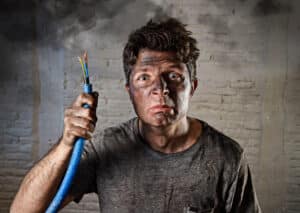Fire Hazards: Avoid these Commercial HVAC Risks
Stay Aware, Stay Safe by Monitoring These Heating and Air Conditioning Elements

We talk every year in this space about carbon monoxide risk and its abatement. A reliable smoke and carbon monoxide alarm should be refreshed with new batteries twice a year: once on the first day of Daylight Savings Time and once on the first day of Standard Time. It’s a habit that saves lives. Along with that, fire safety in your commercial building should be a 24/7 concern. Know the ways you can keep your HVAC system safe. Below, you’ll find a list of the top three risk factors for a commercial HVAC disaster- and the ways to prevent them.
Wiring Issues
This is the number one cause of hazardous situations within your building. If you have an old heating and air conditioning system, or one that seems to be more jerry-rigged by an inexperienced handyman than carefully installed by a certified HVAC professional, it’s important to always pay special attention to the system’s electrical wires and connections. A loose, corroded, or frayed wire can push extra power from your furnace or cause problems with your AC compressor. Obviously, if you ever smell smoke or detect a burning smell coming from your heating or AC equipment, have it inspected, stat. But before that happens, get on a regular maintenance plan with your friendly neighborhood HVAC company. We can head off equipment problems before they spiral into disaster.
Gas Leaks
Older HVAC or a system poorly installed in the first place can lead to ill- fitting gas connections, as well as leaks, and other serious problems. Why risk your health and safety? If anyone in your building smells gas, call the utility immediately. Prevent these kinds of situations from occurring with routine inspections and maintenance of your heating and air conditioning equipment. Remember, low gas pressure can lead to condensation build up in the heat exchanger, and high gas pressure can make the same exchanger excessively hot. Along with risking fire safety, you’ll likely pay excessive amounts in unnecessary utility bills from either situation. Get an HVAC specialist to inspect, repair and monitor your system on a regular basis instead.
Cracked Heat Exchanger
Maintenance and monitoring are key. If you’re not doing regular inspections of your HVAC system, you are taking a chance on any number of equipment breakdowns. A cracked heat exchanger may be one of the worst outcomes of deferred or delayed HVAC upkeep. Carbon monoxide leaks can occur as a result, creating not only an air quality issue for your building but also a huge fire risk.
Check your equipment regularly. Have it repaired as needed, as well as cleaned and maintained. You’ll save real money on your commercial utility bills and avoid problems like the above- and many others. Including a cost-effective annual maintenance plan as part of your operations budget is more than a frugal way to protect your commercial building. It’s about peace of mind, knowing you’re doing everything possible to protect your building and those who use it.
Need to schedule routine HVAC inspection and maintenance? Call Air-Tro today. We’re the heating and air conditioning company the San Gabriel Valley trusts for all its commercial and residential HVAC needs. (626)357-3535.
